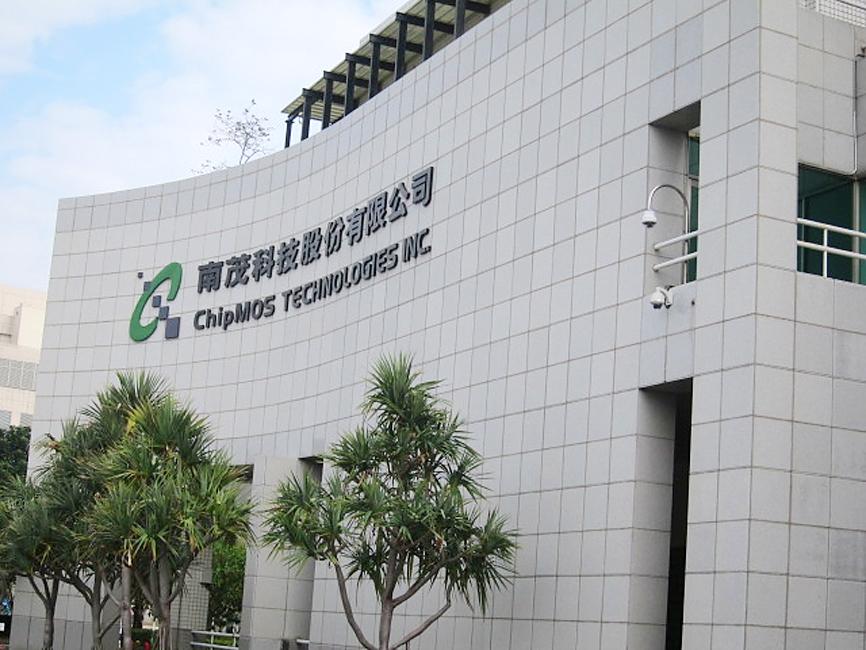ChipMOS Technologies Inc (南茂科技), a driver IC and memorychip tester and packager, expects revenue to increase by a double-digit percentage this year, fueled by strong demand and price hikes amid a supply crunch, company chairman Cheng Chih-chieh (鄭世杰) told an investors’ teleconference yesterday.
“We are quite bullish about ChipMOS’ business outlook this year, as the company is benefiting from improving semiconductor demand and short chip supply,” Cheng said. “We expect to see good growth momentum for our two major products — memorychip packaging and testing services, and display drive ICs.”
Gross margin would rise from 21.9 percent last year, he said.

Photo: Grace Hung, Taipei Times
ChipMOS’s optimism is built on its supply contracts with strategic clients, Cheng said.
Those orders guarantee that its factory utilization would hold steady, he said.
Its factory utilization rate climbed to 85 percent in the final quarter of last year from 76 percent a year earlier, the highest in two years, company data showed.
Revenue this quarter is expected to be similar to last quarter’s NT$6.31 billion (US$223.26 million), which was a record, Cheng said, bucking a downtrend in a slow first quarter this year.
Display driver ICs was the biggest revenue contributor last quarter, at 30 percent, he said.
ChipMOS this quarter is raising prices for its display driver ICs by 5 to 10 percent on average, the second price hike in the past few months, primarily because of higher raw material costs and rising demand, Cheng said.
Demand is strong for driver ICs for notebook computers and TV displays, as well as touch and display driver integration chips for smartphones, he said.
To cope with strong demand, ChipMOS plans to allocate 20 to 25 percent of its revenue this year to add new capacity, the firm said.
Last year, the company spent NT$4.13 billion on new facilities and manufacturing equipment, accounting for less than 20 percent of its revenue, it said.
Net profit contracted 8.4 percent to NT$2.37 billion last year from NT$2.58 billion a year earlier.
Earnings per share dropped to NT$3.26 from NT$3.55.
The company’s board of directors yesterday proposed the distribution of a cash dividend of NT$2.2 per common share, subject to approval by shareholders at the firm’s annual meeting on May 31.
ChipMOS said that it expects to distribute a higher cash dividend next year.

Taiwan Semiconductor Manufacturing Co (TSMC, 台積電), the world’s biggest contract chipmaker, booked its first-ever profit from its Arizona subsidiary in the first half of this year, four years after operations began, a company financial statement showed. Wholly owned by TSMC, the Arizona unit contributed NT$4.52 billion (US$150.1 million) in net profit, compared with a loss of NT$4.34 billion a year earlier, the statement showed. The company attributed the turnaround to strong market demand and high factory utilization. The Arizona unit counts Apple Inc, Nvidia Corp and Advanced Micro Devices Inc among its major customers. The firm’s first fab in Arizona began high-volume production

VOTE OF CONFIDENCE: The Japanese company is adding Intel to an investment portfolio that includes artificial intelligence linchpins Nvidia Corp and TSMC Softbank Group Corp agreed to buy US$2 billion of Intel Corp stock, a surprise deal to shore up a struggling US name while boosting its own chip ambitions. The Japanese company, which is adding Intel to an investment portfolio that includes artificial intelligence (AI) linchpins Nvidia Corp and Taiwan Semiconductor Manufacturing Co (TSMC, 台積電), is to pay US$23 a share — a small discount to Intel’s last close. Shares of the US chipmaker, which would issue new stock to Softbank, surged more than 5 percent in after-hours trading. Softbank’s stock fell as much as 5.4 percent on Tuesday in Tokyo, its

COLLABORATION: Softbank would supply manufacturing gear to the factory, and a joint venture would make AI data center equipment, Young Liu said Hon Hai Precision Industry Co (鴻海精密) would operate a US factory owned by Softbank Group Corp, setting up what is in the running to be the first manufacturing site in the Japanese company’s US$500 billion Stargate venture with OpenAI and Oracle Corp. Softbank is acquiring Hon Hai’s electric-vehicle plant in Ohio, but the Taiwanese company would continue to run the complex after turning it into an artificial intelligence (AI) server production plant, Hon Hai chairman Young Liu (劉揚偉) said yesterday. Softbank would supply manufacturing gear to the factory, and a joint venture between the two companies would make AI data

DOLLAR SIGNS: The central bank rejected claims that the NT dollar had appreciated 10 percentage points more than the yen or the won against the greenback The New Taiwan dollar yesterday fell for a sixth day to its weakest level in three months, driven by equity-related outflows and reactions to an economics official’s exchange rate remarks. The NT dollar slid NT$0.197, or 0.65 percent, to close at NT$30.505 per US dollar, central bank data showed. The local currency has depreciated 1.97 percent so far this month, ranking as the weakest performer among Asian currencies. Dealers attributed the retreat to foreign investors wiring capital gains and dividends abroad after taking profit in local shares. They also pointed to reports that Washington might consider taking equity stakes in chipmakers, including Taiwan Semiconductor